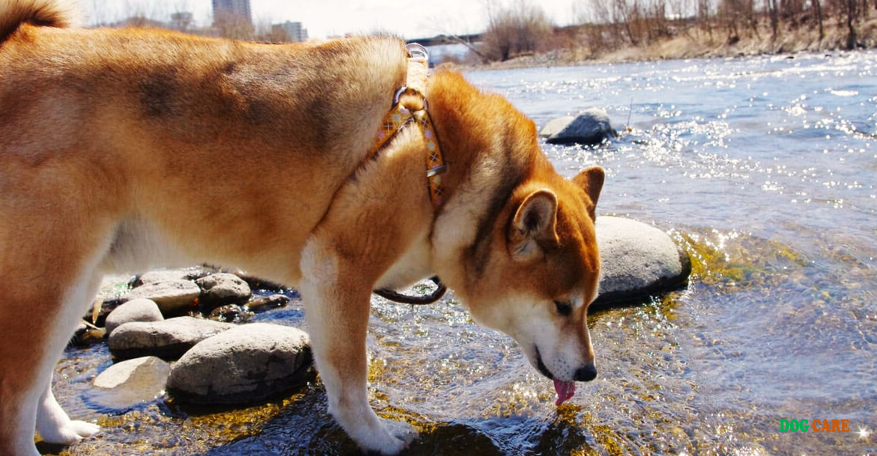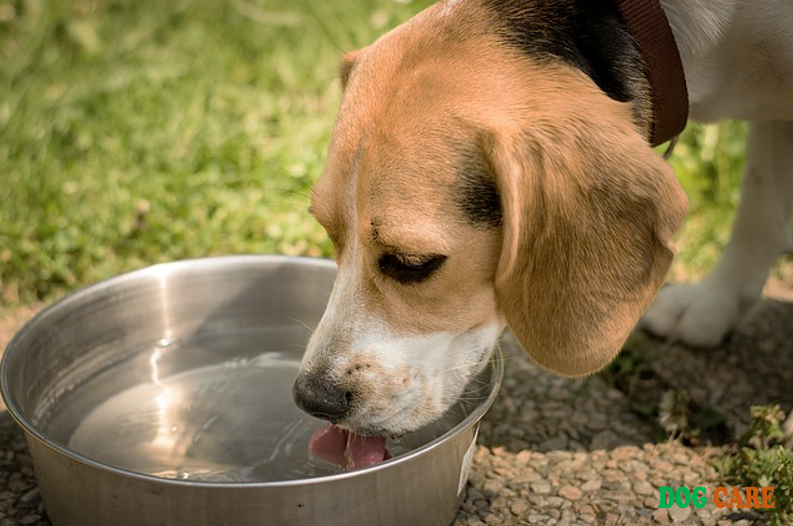Do Dogs Drink a lot of Water Before They Die, as dehydration is a common symptom in dying dogs. This occurs because their body loses fluids faster than it can be replaced, leading to excessive thirst and increased water consumption.

Exploring The Scientific Evidence – Do Dogs Drink a lot of Water Before They Die
Scientific evidence explores the water consumption patterns of dogs before death, shedding light on whether they drink excessively. Is there a correlation between a dog’s water intake and its impending demise?
Normal Drinking Behavior In Dogs
Understanding a dog’s normal drinking behavior is essential when assessing their water intake. Dogs need water to stay hydrated, just like humans do. As responsible pet owners, it is our duty to ensure that our furry friends have access to fresh, clean water at all times. Normal water intake varies depending on factors such as the dog’s size, age, and activity level. It is important to keep in mind that water intake can also fluctuate from day to day based on external factors such as weather and health conditions.
So, how can you determine if your dog’s water intake is normal? A general guideline is that dogs should drink approximately one ounce of water per pound of body weight per day. However, it is essential to remember that individual dogs may have unique needs. It is crucial to observe your dog’s drinking habits over time to establish their regular water intake. If you notice any sudden changes in their drinking behavior, it may be an indication that something is amiss.
Factors Influencing Water Intake In Dogs
Various factors can influence a dog’s water intake. One significant factor is their diet. Dry kibble diets generally necessitate dogs needing to drink more water to stay properly hydrated. Additionally, dogs who consume more salty or protein-rich foods may feel thirstier. Their activity level and environmental conditions also play a role in determining water intake. Hot weather, exercise, and increased panting can lead to higher water consumption as dogs try to regulate their body temperature.
Other factors such as medical conditions, medication, and stress can also impact a dog’s water intake. Diseases like diabetes or kidney problems can cause excessive thirst and increased water intake in dogs. Certain medications may have side effects that increase fluid intake as well. It is crucial to be aware of these factors and consult with a veterinarian if you suspect any underlying medical issues contributing to abnormal water intake in your dog.
Can Excessive Water Intake Predict A Dog’s Death?
While excessive water intake can be a sign of underlying health issues, it is essential to approach the topic with caution. Excessive drinking alone cannot predict a dog’s impending death. While there are instances where excessive water intake may be a symptom of a serious illness, it is crucial not to jump to conclusions based solely on water consumption.
If you notice that your dog is drinking significantly more water than usual, it may be wise to consult with a veterinarian. Excessive thirst, coupled with other symptoms such as weight loss, lethargy, or changes in appetite, could indicate an underlying health problem that requires attention. A professional evaluation is necessary to accurately diagnose and treat any potential health concerns, ensuring the well-being and longevity of your beloved pet.
Understanding The Potential Causes – Do Dogs Drink a lot of Water Before They Die
Dogs drinking excessive amounts of water before their death can be caused by various factors, such as kidney disease, diabetes, or hormonal imbalances. Understanding these potential causes can help in identifying and addressing the underlying health concerns impacting a dog’s water intake.
Understanding the Potential Causes H3: Dehydration and Excessive Thirst in Dogs Dehydration can be a potential cause for excessive water intake in dogs. When a dog is dehydrated, it prompts the body to increase its thirst drive, leading to a noticeable increase in water consumption. Some common causes of dehydration in dogs include prolonged exposure to heat, vomiting, diarrhea, and insufficient fluid intake. It’s important to monitor your dog’s water consumption and ensure they have access to fresh water at all times, especially during hot weather or intense physical activity.
Medical Conditions Affecting Water Consumption Several medical conditions can contribute to excessive thirst in dogs, resulting in increased water intake. One such condition is diabetes mellitus, where the body’s inability to regulate glucose leads to increased urination and thirst. Cushing’s disease, a hormonal disorder, can also cause excessive thirst due to elevated cortisol levels. Additionally, kidney disease and urinary tract infections may affect a dog’s water intake. If you notice a sudden increase in your dog’s water consumption, it’s important to consult with a veterinarian to rule out any underlying medical conditions.
Behavioral Factors that Influence Water Intake Apart from medical conditions, there are behavioral factors that can influence a dog’s water intake. Some dogs tend to drink more water when they are bored or stressed. Others may drink excessively due to anxiety or as a result of certain medications they are taking. It’s essential to observe your dog’s behavior and determine whether any external factors might be contributing to their increased water consumption. If there are no medical issues, addressing the underlying cause of stress or boredom can help regulate their water intake.
In conclusion, understanding the potential causes of excessive thirst and water intake in dogs is crucial for their overall health. Dehydration, medical conditions, and behavioral factors can all contribute to increased water consumption. Regular monitoring, access to fresh water, and timely veterinary consultation can help in maintaining your dog’s hydration levels and overall well-being.
Dissecting The Myth: Examining Case Studies
When it comes to our furry companions, their well-being is always our top priority. Recently, there has been a persistent belief that dogs drink excessive amounts of water before their demise. In order to shed light on this myth, it is crucial to review real-life case studies and analyze the correlation between water intake and mortality.
Reviewing Cases Of Dogs Drinking Excess Water Before Death
Let’s take a closer look at documented cases where dogs were reported to have consumed significant quantities of water before their passing. It is important to note that these cases are anecdotal and do not provide conclusive evidence of a direct correlation between increased water consumption and impending death.
Case 1: A 10-year-old Labrador Retriever named Max
- Max was observed drinking more water than usual in the weeks leading up to his death.
- However, autopsy reports indicated an underlying medical condition unrelated to water intake.
- The excessive water drinking was likely a symptom rather than a cause of his health issues.
Case 2: A 6-year-old Golden Retriever named Bella
- Bella’s owners noticed a significant increase in her water intake and became concerned.
- Unfortunately, Bella passed away unexpectedly.
- However, further examination revealed the presence of a heart condition as the true cause of her demise.
- The excessive water consumption was merely coincidental and not directly related to her death.
Analyzing The Correlation Between Water Intake And Mortality
These case studies highlight the importance of not jumping to conclusions based solely on increased water consumption in dogs. It is crucial to consider that various underlying health conditions may lead to excessive thirst, independent of any impending threat to their lives.
While it is true that dehydration can be a symptom of certain life-threatening illnesses, it is not the case for all situations. It is essential to consult with a veterinarian to investigate further and obtain a comprehensive assessment of the dog’s overall health. Only a professional can identify the potential causes of increased water intake and determine its relevance to mortality.
Alternative Explanations For Increased Water Consumption
It is worth noting that excessive water intake in dogs can be attributed to various factors other than impending death. Some alternative explanations include:
- High activity levels: Dogs who engage in vigorous physical activities tend to drink more water to stay hydrated.
- Hot weather conditions: Just like humans, dogs consume more water to regulate their body temperature during hot weather spells.
- Diets: Certain dog food formulations can increase thirst due to their sodium content, thus leading to increased water intake.
- Medication side effects: Some medications may induce thirst as a side effect, causing dogs to drink more water than usual.
While it is natural to worry when our beloved pets exhibit changes in behavior, including increased water drinking, it is essential to approach the situation responsibly and not automatically associate it with imminent death. By understanding the intricacies involved in a dog’s water consumption and remaining vigilant in monitoring overall health, we can ensure their well-being is maintained to the best of our abilities.
Educating Pet Owners: Promoting Proper Hydration Practices
As responsible pet owners, it is our duty to ensure our furry friends are healthy and well-cared for. One essential aspect of pet care is monitoring their water intake and promoting proper hydration practices. Dogs, like humans, rely on adequate hydration for optimal bodily functions. In this blog post, we will explore the importance of monitoring water intake in dogs, recognize signs of dehydration and excessive thirst, and provide valuable tips for ensuring adequate hydration in our beloved canine companions.
Importance Of Monitoring Water Intake In Dogs
Monitoring your dog’s water intake is crucial for maintaining their overall health. Dogs have different water needs depending on factors such as their size, activity level, and the weather conditions they are exposed to. Adequate hydration supports essential bodily functions, including proper digestion, nutrient absorption, and temperature regulation.
Not providing enough water can lead to dehydration, which can be extremely dangerous for dogs. Dehydration can cause a range of health issues, such as kidney problems, urinary tract infections, and heatstroke. On the other hand, excessive water intake, known as polydipsia, may indicate an underlying health issue, and it is important to monitor and address this as well to ensure your dog’s well-being.
Recognizing Signs Of Dehydration And Excessive Thirst
Being able to recognize signs of dehydration and excessive thirst in your dog is crucial for prompt intervention. Some common signs of dehydration include:
- Lethargy and lack of energy
- Dry nose and gums
- Loss of appetite
- Dark urine or decreased urine output
- Sunken eyes
- Panting excessively
On the other hand, excessive thirst may be indicated by:
- Drinking water more frequently than usual
- Constantly seeking out sources of water
- Urinating more frequently
- Restlessness or signs of discomfort
If you notice any of these signs, it is essential to address potential hydration issues promptly and consult with a veterinarian to determine the underlying cause.
Tips For Ensuring Adequate Hydration In Dogs
To ensure your dog stays adequately hydrated, try implementing the following tips:
- Always provide fresh and clean water in a suitable-sized bowl that is easily accessible to your dog. Ensure the water is changed regularly, especially in hot weather.
- Consider using automatic water dispensers or fountains to encourage your dog to drink more.
- Monitor your dog’s water intake if they have certain health conditions that require special attention.
- During hot weather or periods of increased physical activity, offer your dog frequent water breaks and consider providing a shaded area for them to rest.
- Incorporate water-rich foods into your dog’s diet, such as canned dog food or fresh fruits and vegetables (avoid any harmful foods for dogs).
- Remember, each dog is unique, and their water intake may vary. Regularly monitor their water consumption and consult with a veterinarian if you have concerns.
By following these tips and being mindful of your dog’s hydration needs, you can play a vital role in maintaining their overall health and well-being.

Frequently Asked Questions Of Do Dogs Drink A Lot Of Water Before They Die
How Much Water Does A Dog Need Daily?
Dogs need about 1 ounce of water per pound of body weight each day.
Why Do Dogs Drink A Lot Of Water Before They Die?
Dogs may drink excess water due to kidney disease or diabetes, which can be signs of nearing the end.
What Are The Signs Of Dehydration In Dogs?
Signs of dehydration in dogs include loss of skin elasticity, dry gums, sunken eyes, and lethargy.
How Can I Prevent My Dog From Drinking Too Much Water?
Ensure your dog has access to fresh water and monitor their drinking habits for any sudden increase or decrease.
Can Excessive Thirst In Dogs Be A Symptom Of Illness?
Yes, excessive thirst in dogs can be a symptom of medical conditions such as kidney disease or diabetes.
Conclusion
Understanding the reasons behind excessive thirst in dogs is essential for their well-being. While an increase in water consumption can be normal in certain cases, it may also indicate an underlying medical condition that requires immediate attention. By observing their drinking habits and consulting a veterinarian, pet owners can ensure their dogs stay hydrated and healthy.
Remember, proper hydration is crucial for our furry friends‘ overall health and happiness.
Do Dogs Drink a lot of Water Before They Die


